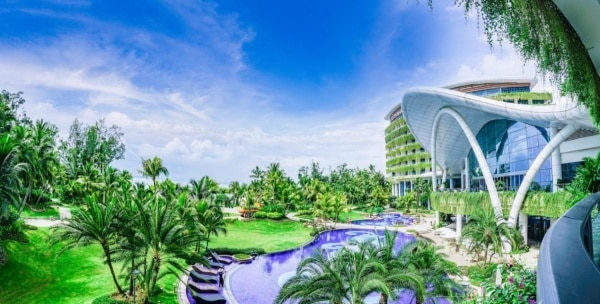Forest City, the smart city project in the Malaysian state of Johor, renewed its commitment to sustainable development by protecting mangroves around the construction area of the 30-km man-made islands.
“It is vital to protect mangroves for that they provide habitats for thousands of species of marine life and migratory birds,” said Muhammad Syafiq Abdulla, senior landscape officer at Forrest City. “What's more, they also help combat global warming by removing carbon dioxide from the atmosphere. If the mangroves along the coast disappear, humans will lose their natural buffer against strong winds and waves.”
Syafiq will lead the team of the landscape department to carry out the work of mangrove protection. It includes monitoring the mangrove coastline, collecting seeds, and cultivating their germination in the nursery. In addition to conservation, Forest City intends to share knowledge through the establishment of ecological museums. By doing this, tourists can learn more about the precious natural resources of Malaysia, as well as the ecosystem of Forest City.
Mangrove conservation the latest project at Forest City aimed at protecting the area’s ecological and environmental balance. In previous months, it has invested some 2.5 ringgit (approximately US$600,000) to establish protection zones for sea grass in partnership with local universities with the aim of improving the habitats in which dugongs, sea turtles and sea horses, among other endangered species, live.
The city also plans to build eight wastewater treatment plants, which will use advanced biotechnologies to convert wastewater into recycled water available for reuse in order to address
Forest City's irrigation water needs and help relieve any stress on Johor Bahru's water system.
Sustainable development
Located within the Iskandar Malaysia special economic zone (SEC) in southern Johor, Forest City comprises four man-made islands spanning 30 square kilometres. Last year, more than 20,000 residential units were handed over to owners on top of the more than 4,000 that already have been.
It is a joint venture between Country Garden Pacificview and Esplanade 88 Danga Bay. As of October last year, investments into Forest City reached more than 17 billion ringgit. The first island (Island 1) is 50%reclaimed and comprises a fully occupied retail complex, the five-star Phoenix International Marina Hotel, commercial units, a sales gallery, and Shattuck-St Mary’s Forest City International School. The remaining three islands (Islands 2-4) will be built based on “property demand and supply”.
Forest City is seen one of the world's model cases for ecologically sustainable cities for its innovative approach to building a city based on the concept of three-dimensional stratification in terms of the layout of transportation routes and vertical greenery.
Forest City has created a new paradigm of ecologically sustainable cities with its transportation network and a parks system that makes use of all three dimensions in its planning and layout, adding a vertical layer – something that is rarely considered in most typical urban environments.
In a press statement last year, Forest City executive general manager Wu Huixi indicated that according to the architectural planning and design of the smart city project, an eco-friendly system consisting of vertical greenery, sky gardens and rooftop gardens will be installed across the city with the mission of creating a landscape, which could be described as a vertical forest, where nature and buildings co-exist harmoniously.
The three-dimensional and vertical greening design embodies the city's concept of creating a complete environment-friendly ecosystem by leveraging the natural wind, lighting and water resources in a move to reduce energy consumption, assure residents of clean air, collect rainwater in a move to conserve water resources and reduce noise.



